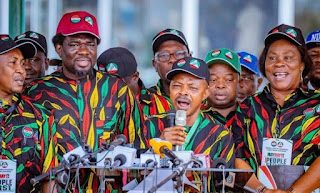As inflation continues to erode Nigerians’ purchasing power, the Nigeria Labour Congress (NLC) has called for an urgent review of the national minimum wage, insisting that the current ₦70,000 is no longer adequate.
The demand arose as many states recognized the unsustainability of the current minimum wage and increased it beyond the approved ₦70,000 benchmark.
The NLC leadership stated that, amid surging inflation and rising costs of food, transportation, housing, and other essential services, the ₦70,000 minimum wage is no longer viable.
It is recalled that President Bola Tinubu signed the new National Minimum Wage Bill into law in July 2024, raising the minimum wage from ₦30,000 to ₦70,000.
Before the bill was enacted, Edo State Governor Godwin Obaseki announced an increase in the minimum wage for state workers from ₦40,000 to ₦70,000 to mitigate the economic hardships faced by the populace.
Similarly, on August 27, 2025, Governor Hope Uzodimma of Imo State increased the state’s minimum wage from ₦70,000 to N104,000, along with corresponding salary adjustments for civil servants.
On October 16, 2024, Lagos State Governor Babajide Sanwo-Olu announced a raise to ₦85,000, with plans to increase it to ₦100,000 in 2025.
Rivers State approved a minimum wage of ₦85,000 on October 18, 2024, while Bayelsa, Niger, Enugu, and Akwa Ibom states approved ₦80,000 for their workers.
Ogun and Delta states are implementing a ₦77,000 minimum wage, while Benue and Osun states increased theirs to ₦75,000, and Ondo State pegged its at ₦73,000.
Mr. Benson Upah, Acting General Secretary of the NLC, told journalists in Abuja on Sunday that inflation has diminished the value of the ₦70,000 minimum wage, leaving many workers unable to meet basic needs.
“The truth is that ₦70,000 is not sustainable under the present economic situation.
“Workers are under immense pressure, and unless the government responds swiftly, the crisis of survival will only worsen.
“We have since engaged the Federal Government on this matter at different times and fora.
“It is our hope that the government would see both the economic and moral obligations to do so expeditiously,” he said.
Upah also noted that while labor would remain open to dialogue, industrial action might be considered if negotiations fail.
He urged workers to stay united and active within unions to strengthen their collective bargaining power.
Similarly, Mr. Shehu Mohammed, President of the Association of Senior Civil Servants of Nigeria (ASCSN), praised the state governors who have raised their minimum wages.
He called the move a positive development and a wake-up call.
The ASCSN president said that the actions of the sub-national governments should serve as a signal to the federal government.
“Right from the beginning, during the negotiation, our demand was for a living wage, and we submitted ₦250,000 as a reasonable benchmark.
“We told the government that anything short of that only takes a worker to the gate of the office, not back home,” he said.
He explained that with high electricity tariffs, transportation costs, and food prices soaring, ₦70,000 has lost its purchasing power.
“Let’s be realistic. Even if you pay electricity bills out of ₦70,000, what remains cannot sustain a family for 10 days,” he added.
Mohammed further urged the federal government to complement wage increases with broader policies aimed at reducing the cost of living, including affordable housing, healthcare, and subsidized transportation.









